Frustration, concern mounting in U.S. as daily COVID-19 cases hit six-month high
-- COVID-19 cases, hospitalizations and deaths continue to increase in most parts of the United States, especially in communities with lower vaccination coverage.
-- During the last two weeks of July, the Delta variant accounted for an estimated 93.4 percent of all new COVID-19 cases in the country.
-- The latest surge has raised new questions about the significant inadequacies in the U.S. disjointed, piecemeal response to the pandemic, which has been led by governors, mayors and local health departments with the federal government playing a supporting role.
-- Nearly 18 months into the pandemic, there's no consensus on masking, vaccination and other mitigation measures because of partisan divide and political polarization.
WASHINGTON, Aug. 9 (Xinhua) -- Frustration and concern are mounting across the United States as the country's new COVID-19 cases, fueled by the highly contagious Delta variant, hit a six-month high at more than 100,000 cases a day.
The seven-day average of daily COVID-19 cases in the United States was more than 107,100 as of Friday, according to data from the Johns Hopkins University. The last time the seven-day average of COVID-19 cases surpassed 100,000 in the country was on Feb. 11.
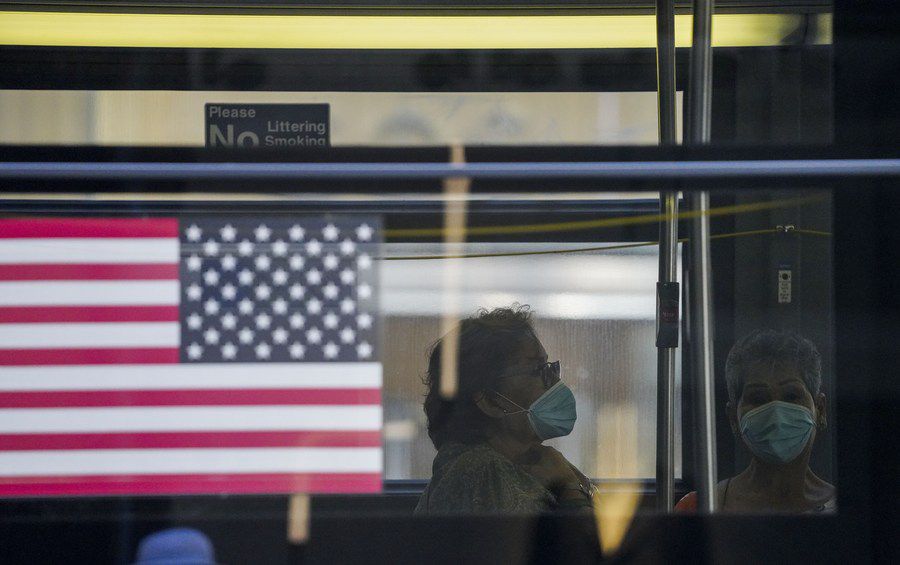
Passengers with face masks are seen in a bus in New York City, the United States, Aug. 2, 2021. (Xinhua/Wang Ying)
"IT'S TAKING NEEDLESS TOLL ON OUR COUNTRY"
COVID-19 cases, hospitalizations and deaths continue to increase in most parts of the United States, especially in communities with lower vaccination coverage, the U.S. Centers for Disease Control and Prevention (CDC) said in a weekly report on Friday.
The situation is especially dire in southern states including Florida, Texas, Arkansas and Louisiana where vaccination rates continue to lag.
The Delta variant accounted for an estimated 93.4 percent of all new COVID-19 cases in the country during the last two weeks of July, showed the latest CDC data.
Anthony Fauci, head of the National Institute of Allergy and Infectious Diseases, has warned that U.S. COVID-19 cases may double to 200,000 a day in the fall unless the country could crush the outbreak "to the point of getting the overwhelming proportion of the population vaccinated."
Fauci said he is concerned the high number of unvaccinated people could lead to a stronger variant emerging that could reduce the efficacy of previously-administered vaccines.
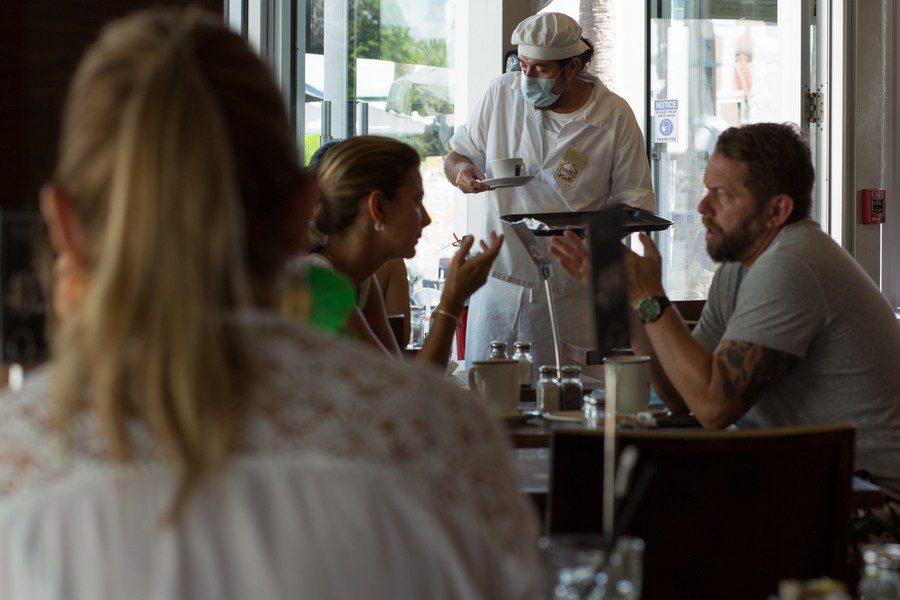
A waiter wearing a mask serves customers at a restaurant in Miami-Dade County, Florida, the United States, Aug. 6, 2021. (Photo by Monica McGivern/Xinhua)
"So wear a mask when recommended, get vaccinated today," said President Joe Biden at a White House event on Friday.
"It's a pandemic of the unvaccinated," Biden said. "It's taking a needless toll on our country."
"The frustrating part is this is all preventable," Peter Hotez, dean of the National School of Tropical Medicine at Baylor College of Medicine, told CNN's Pamela Brown on Thursday.
"Had we really accelerated throughout May and June and fully vaccinated the country ... we wouldn't have to worry about this so much," said Hotez.
As of Friday, 50 percent of the U.S. population -- about 165.9 million people -- had been fully vaccinated against the virus, according to the CDC. Roughly 193.7 million, or 58.4 percent of all Americans, received at least one dose.
A CDC ensemble forecast, published on Wednesday, illustrated that 2,300 to 9,100 new deaths, 6,700 to 24,000 new confirmed COVID-19 hospital admissions, and 350,000 to 1,800,000 new cases would be likely reported in the week ending Aug. 28.
The resurgence of COVID-19 came just more than a month after Biden said the United States had "gained the upper hand" and that it was "closer than ever to declaring our independence from a deadly virus" at the White House on July 4, the Independence Day.
In June, the United States averaged about 11,000 new COVID-19 cases per day, a low point since the start of the pandemic.
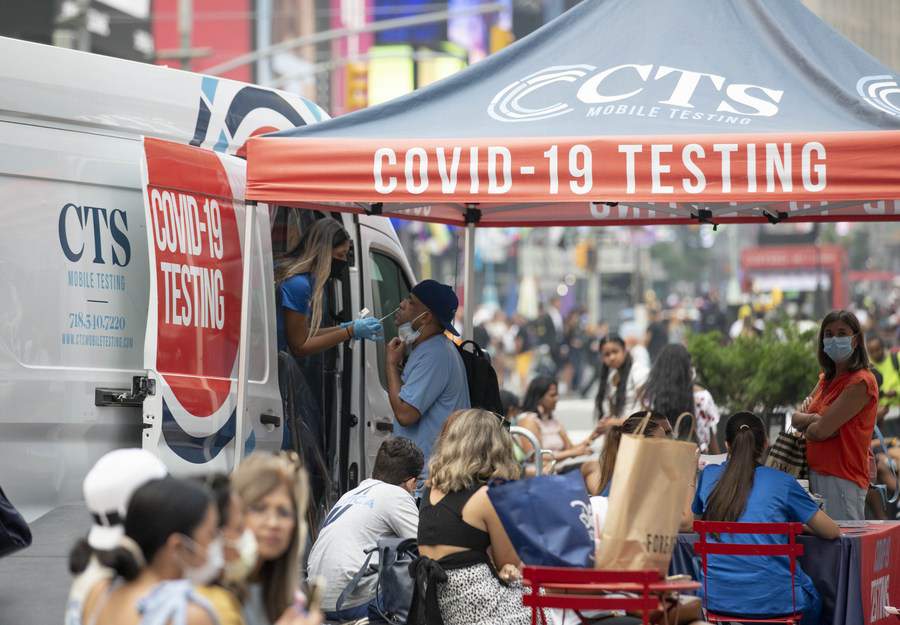
A man receives a COVID-19 test at a mobile testing site in Times Square, New York, the United States, July 20, 2021. (Xinhua/Wang Ying)
"WE DON'T REALLY NEED TO BE POLARIZED"
The latest surge has raised new questions about the significant inadequacies in the U.S. disjointed, piecemeal response to the pandemic, which has been led by governors, mayors and local health departments with the federal government playing a supporting role.
What is worse, nearly 18 months into the pandemic, there's no consensus on masking, vaccination and other mitigation measures because of partisan divide and political polarization, health experts said.
The political firefight around COVID-19 is only getting more intense.
On Tuesday, Biden criticized Florida Governor Ron DeSantis and other Republican governors for banning mask mandates in public schools and other places.
"I say to these governors, please help. If you aren't going to help, at least get out of the way of people who are trying to do the right thing," said Biden.
A day later, DeSantis, whose state is experiencing a dangerous spike in the pandemic, hit back.
"If you're trying to restrict people, impose mandates, if you're trying to ruin their jobs and their livelihoods and their small business, if you are trying to lock people down, I am standing in your way," said DeSantis.
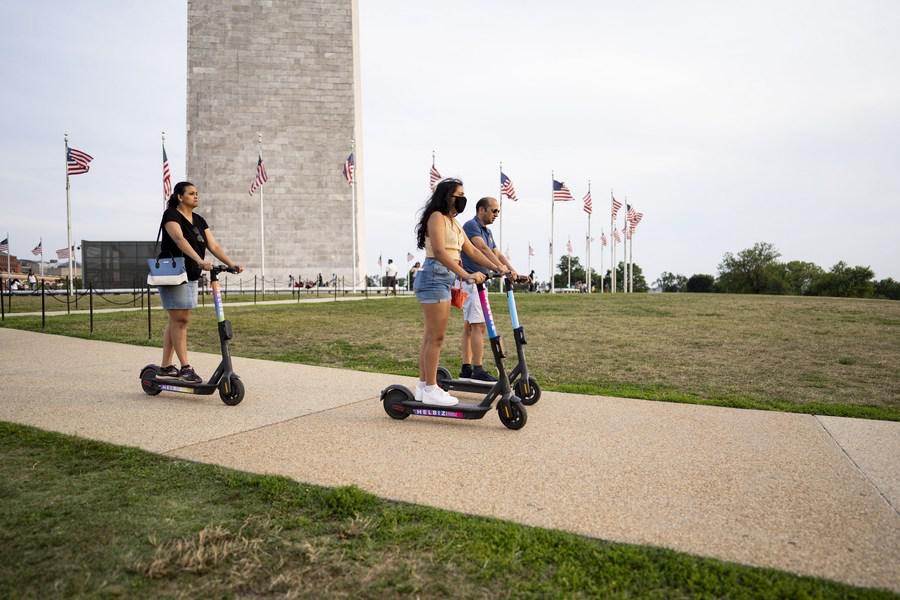
People visit the Washington Monument in Washington, D.C., the United States, Aug. 6, 2021. (Xinhua/Liu Jie)
A recent Washington Post-ABC News poll found 47 percent of Republican respondents said they were unlikely to get vaccinated, compared with 6 percent of Democrats who said so. Among Republicans, 38 percent said they definitely would not get the shots.
Moreover, misinformation regarding the virus and vaccines, which is spreading like wildfire across social media platforms, has also undercut Biden's vaccination push. Social media users called "anti-vaxxers" have posted ridiculous conspiracy theories on the vaccines.
The issue also underscores the deep divide between liberal and conservative Americans.
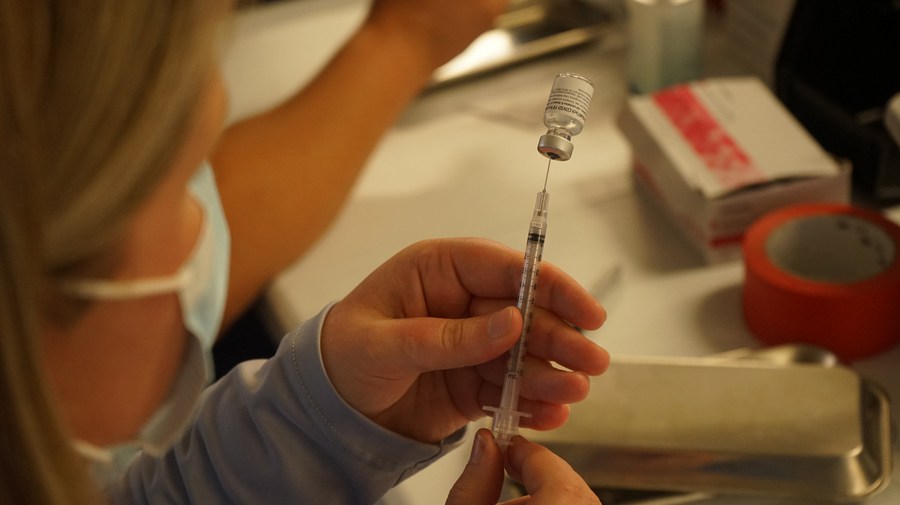
A medical worker prepares a dose of COVID-19 vaccine at the Universal Studios Hollywood in Los Angeles, California, the United States, June 18, 2021. (Photo by Zeng Hui/Xinhua)
Brookings Institution Senior Fellow Darrell West told Xinhua recently that the anti-vaxxers "definitely lean right and tend to be (Donald) Trump supporters."
Most unvaccinated American adults don't believe that COVID-19 vaccines are very effective and see the vaccines as a greater health risk than the virus itself, according to a survey by Kaiser Family Foundation published Wednesday.
Appearing on ABC's "This Week With George Stephanopoulos" on Sunday, Francis Collins, director of the National Institutes of Health (NIH), lamented that the notion of vaccination remains so politicized amid the ongoing uptick in COVID-19 cases.
"How did we get here? Why is it a mandate about a vaccine or wearing a mask becomes a statement of your political party? We never should have let that happen," he said.
"Come on, America, we can separate these, can't we? We're incredibly polarized about politics, we don't really need to be polarized about a virus that's killing people. We ought to be doing everything we can to save lives," said Collins.
As of Sunday afternoon, more than 35.7 million Americans were infected with COVID-19 and over 616,000 were killed, showed data compiled by the Johns Hopkins University.
Nearly 72,000 kids and teens were found to be infected with COVID-19 in the last week of July, representing 19 percent of total COVID-19 infections, according to the American Academy of Pediatrics.
Photos
Related Stories
- Central Chinese city classifies 7 areas as high-risk for COVID-19
- Beijing steps up COVID-19 prevention and control measures in sports facilities
- China curbs acts hindering anti-epidemic efforts
- Sri Lanka receives another batch of Sinopharm vaccines
- China's Wuhan completes citywide testing to curb COVID-19 resurgence
Copyright © 2021 People's Daily Online. All Rights Reserved.










